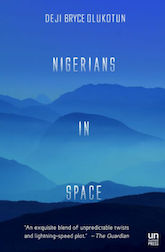We all have expectations when begin reading a story. There are boundaries within which we expect the narrative to unfold, and certain ground rules that seem like they should be in place. This doesn’t extend to the point of tropes: it’s more a case of where we can envision a story going. Narrative swerves, such as a thrilling narrative seemingly set in medieval France that turns itself into a space opera, or a drawing-room mystery that abruptly becomes a torrid paranormal romance, can stun readers when done well, but bewilder them if they’re not handled with the deftest of touches.
All of which brings us to the novels of Deji Bryce Olukotun, Nigerians in Space and its followup, After the Flare. Both offer a host of narrative perks: Olukotun writes with a genuinely international scope, and he’s as adept at charting out backroom espionage as he is bolder action setpieces or the inner workings of a dysfunctional family under considerable duress. But even those qualities aren’t necessarily the most notable aspects of these novels. Instead, it’s the qualityOlukotun imparts to these narratives wherein he’s able to shift subtly from one genre mode to another without losing the momentum he’s accrued so far.
 Olukotun’s first novel, Nigerians in Space, begins in an unlikely place for a book whose title suggests a spacefaring epic. It’s Houston in 1993, and protagonist Wale Oloufunmi is persuaded to return to the country of his birth with his family in tow—along with a lunar artifact he’s asked to acquire from his job at NASA. He’s been enlisted to take part in an government initiative headed by an ambitious and well-connected political figure—only things don’t go as planned. Olukotun introduces a number of subplots taking place at different moments in time: some focus on the abalone trade in contemporary South Africa, while another thread follows Melissa, the daughter of another scientist recruited at the same time as Wale, and the surreal path that her life takes over the ensuing years.
Olukotun’s first novel, Nigerians in Space, begins in an unlikely place for a book whose title suggests a spacefaring epic. It’s Houston in 1993, and protagonist Wale Oloufunmi is persuaded to return to the country of his birth with his family in tow—along with a lunar artifact he’s asked to acquire from his job at NASA. He’s been enlisted to take part in an government initiative headed by an ambitious and well-connected political figure—only things don’t go as planned. Olukotun introduces a number of subplots taking place at different moments in time: some focus on the abalone trade in contemporary South Africa, while another thread follows Melissa, the daughter of another scientist recruited at the same time as Wale, and the surreal path that her life takes over the ensuing years.
Here, Olukotun balances a couple of narrative threads: a thriller spanning multiple continents with an increasingly paranoid man at its center; a more restrained tale of underworld activities; and the subplot focusing on Melissa, which adds a surreal element to the proceedings and establishes that, for all of the grit and danger present in the novel, this isn’t necessarily an entirely realistic work of fiction. Olukotun has left himself some space to introduce stranger elements–and while the bulk of Nigerians in Space feels familiar, the presence of the scenes with Melissa tip things ever-so-slightly into the delirious. Or, more precisely, they remind the reader that there’s more afoot her than simply the power plays of governmental factions and the unnerving experience of a life spent on the run.
 For a while, as one reads After the Flare, its connection to Olukotun’s earlier novel—or even if there is one–isn’t clear. While Nigerians in Space spanned the mid-90s to the present day, After the Flare is set in the very near future, after a solar flare has reshaped geopolitics—and, in the opening scene, left one cosmonaut stranded in a space station orbiting the Earth. When the action picks up a year later, the reader meets Kwesi Bracket, an American now working for Nigeria’s space program. The flare’s effects on Earth include the widespread disruption of power and communications networks, and a geopolitical boost to those nations nearest to the Equator, who are largely unaffected.
For a while, as one reads After the Flare, its connection to Olukotun’s earlier novel—or even if there is one–isn’t clear. While Nigerians in Space spanned the mid-90s to the present day, After the Flare is set in the very near future, after a solar flare has reshaped geopolitics—and, in the opening scene, left one cosmonaut stranded in a space station orbiting the Earth. When the action picks up a year later, the reader meets Kwesi Bracket, an American now working for Nigeria’s space program. The flare’s effects on Earth include the widespread disruption of power and communications networks, and a geopolitical boost to those nations nearest to the Equator, who are largely unaffected.
In the initial chapters, Olukotun feints in the direction of one possible direction for the narrative: that this will be a tale of a race against time to rescue some from a perilous situation far from the surface of the Earth. It’s a familiar narrative, and one that’s appealing—think Apollo 13, think The Martian. But, just as he did with Nigerians in Space, Olukotun adds a host of subplots that increase the scope of his novel—everything from the looming dangers of a terrorist group to the presence of a group of actors brought in to heighten the space program’s profile. There are also some memorably surreal glimpses of near-future technology, from smartphones that act like geckos to biohacked insects used for a host of espionage-related tasks. And there’s also some very old technology: another thread of the novel delves back into regional history and turns the scope of the book into something less speculative and more cyclical.
In keeping with that, a couple of characters from Nigerians in Space end up making appearances—though each novel stands on its own quite well. Taken together, though, they delineate a fascinating narrative scope: these are stories in which ancient history coexists with urgent contemporary concerns, where technology evolves into unexpected forms, where seemingly minor narrative digressions can pay off on an epic scale. It isn’t always easy to see where Olukotun’s novels are headed, but that’s part of their appeal—and entirely appropriate for works that are, gradually and unexpectedly, leading the reader into the future.
Nigerians in Space and After the Flare are available from The Unnamed Press.
 Tobias Carroll is the managing editor of Vol.1 Brooklyn. He is the author of the short story collection Transitory (Civil Coping Mechanisms) and the novel Reel (Rare Bird Books).
Tobias Carroll is the managing editor of Vol.1 Brooklyn. He is the author of the short story collection Transitory (Civil Coping Mechanisms) and the novel Reel (Rare Bird Books).










